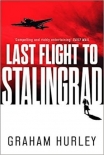Last Flight to Stalingrad Graham Hurley (sight word books .TXT) 📖

- Author: Graham Hurley
Book online «Last Flight to Stalingrad Graham Hurley (sight word books .TXT) 📖». Author Graham Hurley
Until now, he’d resisted opening Goebbels’ letter. For once, because Schultz had finally run out of vodka, he was completely sober. The letter was still in the breast pocket of the jacket he’d worn the night he’d flown back from Berlin. He fetched it out and stared for a long moment at the envelope.
How much of the last few months, maybe much longer, had been shaped by this letter? Without this gun to Goebbels’ head, what else might have happened? Would he and Maria still be together in Guram’s apartment, untroubled by a Nazi chieftain desperate to reclaim his mistress? Had he been crazy to bend the knee, and play the messenger, and take the train south to Italy? To all of these questions he knew there was only one answer, the Georgian answer, the answer of the apprentice butcher who’d turned his back on the mountains and sought a life elsewhere. You do what you do. And face the consequences.
He used a penknife he’d acquired from Schultz to open the envelope. Inside, as expected, he found three folded sheets of paper. He slid them out and flattened them in the flickering light of the paraffin lamp. Anticipating paragraph after paragraph of Goebbels at full throttle, he found himself looking at three sheets of music. This was a language he didn’t speak. His eyes tried to follow the notation at the top of the first page. Hopeless. There were no clues to what this music, this tune, might be, but the implications were only too clear, and he realised at last why Maria, in Berlin, had been so close, and yet so far.
For whatever reason, she’d betrayed him.
33
STALINGRAD, 16 JANUARY 1943
Nothing to lose, Nehmann told himself.
The sniper, Schmidt, reported to the bus depot an hour or so after dawn. He was wearing camouflage, entirely white. His journey on foot, he said, had taken more than two hours and every next step had revealed more evidence of the army disintegrating in front of his eyes. Infantrymen pissing on each other’s hands. Reinforcement companies turned away from the field hospital, limping towards the front line. How strange a man looked when he’d lost his ears to frostbite.
Nehmann, only too aware that the battle might be over within days, was impatient.
‘We have to do this thing,’ he told Schultz, ‘before the Ivans get here.’
Schultz agreed. There was half a tank of fuel left in the Kübelwagen. They went outside into the cold. Snow was forecast and the first flakes were swirling in the wind. Schmidt was looking dubious. With no visibility and a wind like this, a clean shot would be impossible.
‘Then get closer,’ Nehmann said. ‘Give me the rifle and I’ll do it myself.’
They drove to Tsarytsin. The snow was still holding off. Schultz followed Nehmann’s directions and brought the Kübelwagen to a halt fifty metres from the remains of Kalb’s commandeered quarters. It turned out that Schmidt had already paid this place a visit, noted the well, paced the distance to the frozen stream. Impressed, Nehmann extended a hand over the back of his seat.
‘Good luck,’ he said.
Schmidt checked his rifle, wiped a smear from the telescopic sight, and got out of the car. Nehmann watched him walking away, back down the road. Schultz wanted to know where the fuck he thought he was going.
‘He’ll circle round,’ Nehmann said. ‘He thinks of everything.’
Schultz grunted something Nehmann didn’t catch, then got out of the car and propped up the rear flap that exposed the engine. No one in this city cared any more about a broken-down Kübelwagen, but if the Chain Dogs arrived Schultz needed a reason to be here.
‘And now?’ He was back in the car, blowing on his hands.
‘We wait.’
Nothing happened. From time to time, not often, Nehmann caught the distant bark of anti-aircraft fire and then the distinctive drone of a Tante-Ju that must have made it through to the emergency airfield at Gumrak. Once, a horse and cart appeared, heavily laden with wounded. The horse plodded past, the lone driver barely lifting his head to acknowledge the presence of the Kübelwagen. Most of the soldiers, lying prone in the back of the cart, appeared to be dead.
‘Seventeen.’ Nehmann smothered a yawn.
‘Bodies?’
‘Ribs.’
Schultz gave him a look. Lately, thought Nehmann, he has the eyes of an old man.
‘You counted them? The ribs of the horse?’
‘I did.’
‘Verrückt.’You’re crazy.
Nehmann nodded. He agreed with crazy. Maybe nineteen, he thought. Maybe twenty. Maybe a hundred ribs. Who cares any more? He tried to stretch his legs in the cramped chill, staring out through the windscreen. A film of ice blurred the view but it seemed to him that the sky, full of snow, was getting darker by the minute.
To the right, across the whiteness of the steppe, he could see no sign of Schmidt but he expected nothing less because the man had mastered the arts of invisibility. In his white camouflage, he could literally disappear, become one with the savage emptiness of this ruined landscape until the moment came to steady his rifle on its little tripod, and settle the cross-hairs on the folds of Kalb’s greatcoat, and take the lightest breath before squeezing the trigger. Who would ever notice in a city like this? Just one more rifle shot? Just one more body in the snow? Who’s counting any more?
Except that Kalb wouldn’t die. Not out there in the snow. Not yet. Nehmann had found a





Comments (0)